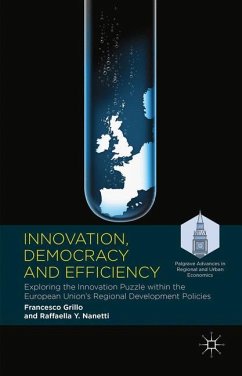Endogenous growth theory has significantly impacted most of the developing and developed countries, shifting priorities of industrial policies towards innovation. In line with this trend, the European Union significantly increased its budgetary allocation for R&D. However, statistical data show a weak correlation between R&D expenditure and the acceleration of economic growth. Regional innovation policies display divergent returns according to different institutional conditions and policy choices.
Grillo and Nanetti attempt to understand the reasons that lie behind differences in performance. Their results show that better performing innovation strategies require the following factors: clear choices of locally congruent smart specialization; strong capacity of public investment to stimulate additional private investment; clear distribution of responsibilities for decision-making and independence of policy implementation from political interference; and problem solving partnerships amongst innovators, universities, and governments that pre-exist the programmes. These factors point to a relationship between democracy (defined as openness of policy-making) and innovation (as technology-enabled growth) which is explored throughout this book.
Grillo and Nanetti attempt to understand the reasons that lie behind differences in performance. Their results show that better performing innovation strategies require the following factors: clear choices of locally congruent smart specialization; strong capacity of public investment to stimulate additional private investment; clear distribution of responsibilities for decision-making and independence of policy implementation from political interference; and problem solving partnerships amongst innovators, universities, and governments that pre-exist the programmes. These factors point to a relationship between democracy (defined as openness of policy-making) and innovation (as technology-enabled growth) which is explored throughout this book.
Newspaper reading is in decline, but people are more informed. Revolutions are led through Facebook. Citizens and stakeholders in the EU regions also demand to be part of the conversation when shaping the future. To find out how this works, read Grillo and Nanetti's thought provoking insight on democratic participation in setting EU innovation policies in this new brave world.'
- Professor Birgitte Andersen, CEO and CoCreator, Big Innovation Centre, London, UK
'There is a direct link between the quality of a democracy and its ability to innovate. In this book Francesco Grillo and Raffaella Y. Nanetti analyse the complexity of such a link. As a result, they offer to governments, academics and innovators a clear model of how a coherent innovation system should work in the era of interdependence. Their work is inspirational for policy makers in Italy and Europe.'
- Stefania Giannini, Minister of Education, Universities and Research, Italy
'A must readfor all academics and policy makers interested in understanding the relevance and defining features of successful innovation policies in today's globally interdependent economy under the accelerating pace of technological change.'
- Mikel Landabaso, Acting Director Directorate H, Inclusive Growth, Urban and Territorial Development and Northern Europe, Regional Policy, European Commission, Brussels, Belgium
'In this very useful book Francesco Grillo and Raffaella Y. Nanetti recognize that innovation is as much a political and institutional project as a technical one. Would-be innovators - and the local, national or regional policy makers who want to help them - ignore this insight at their peril. Political coalitions, leadership and institutional design matter, as Grillo and Nanetti show through well-selected case studies.'
- Ernest Wilson, Dean and Walter Annenberg Chair in Communication, University of Southern California, USA
- Professor Birgitte Andersen, CEO and CoCreator, Big Innovation Centre, London, UK
'There is a direct link between the quality of a democracy and its ability to innovate. In this book Francesco Grillo and Raffaella Y. Nanetti analyse the complexity of such a link. As a result, they offer to governments, academics and innovators a clear model of how a coherent innovation system should work in the era of interdependence. Their work is inspirational for policy makers in Italy and Europe.'
- Stefania Giannini, Minister of Education, Universities and Research, Italy
'A must readfor all academics and policy makers interested in understanding the relevance and defining features of successful innovation policies in today's globally interdependent economy under the accelerating pace of technological change.'
- Mikel Landabaso, Acting Director Directorate H, Inclusive Growth, Urban and Territorial Development and Northern Europe, Regional Policy, European Commission, Brussels, Belgium
'In this very useful book Francesco Grillo and Raffaella Y. Nanetti recognize that innovation is as much a political and institutional project as a technical one. Would-be innovators - and the local, national or regional policy makers who want to help them - ignore this insight at their peril. Political coalitions, leadership and institutional design matter, as Grillo and Nanetti show through well-selected case studies.'
- Ernest Wilson, Dean and Walter Annenberg Chair in Communication, University of Southern California, USA








